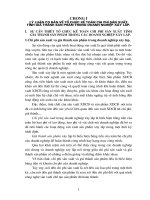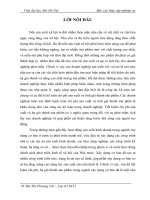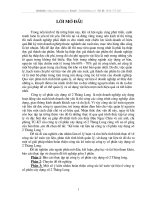GCSE 207
Bạn đang xem bản rút gọn của tài liệu. Xem và tải ngay bản đầy đủ của tài liệu tại đây (70.27 KB, 5 trang )
SƠ GD&ĐT VINH PHUC
TRƯƠNG THPT LIỄN SƠN
(Đề thi gồm: 05 trang)
ĐỀ KSCL ÔN THI THPT QG NĂM HỌC 2019-2020
BÀI THI MƠN: TIẾNG ANH 207
Thời gian làm bài: 60 phút, khơng kể thời gian phát đề
Ho va tên thi sinh:……………………………………………………………………. SBD:…………………………
Mark the letter A, B, C, or D on your answer sheet to indicate the word that differs from the
other three in the position of primary stress in each of the following questions.
Question 01. A. expression B. decisive
C. dependent
D. independent
Question 02. A. decision
B. reference
C. refusal
D. important
Mark the letter A, B, C, or D on your answer sheet to indicate the underlined part that needs
correction in each of the following questions.
Question 03. Had the committee members considered the alternatives more carefully, they would
have realized that the second was better as the first.
A. Had the committee B. more carefully
C. the second was D. as the first
Question 04. It is important that cancer is diagnosed and treated as early as possible in order to
assure a successful cure.
A. is
B. treated
C as early as
D. to assure
Question 05. The old and the new in transportation also contrast sharply in Middle East.
A. The old and the new B. also contrast C. sharply
D. Middle East
Mark the letter A, B, C, or D on your answer sheet to indicate the correct answer to each of the
following questions.
Question 06. __________ he has a headache, he has to take an aspirin.
A. How
B. Because
C. Where
D. Although
Question 07. They have just visited the town__________ location was little known.
A. where
B. whose
C. which
D. that
Question 08. The schoolboy’s excuse wasn’t__________ at all. Nobody in the classroom believed in
the far-fetched story he told.
A. credential
B. credible
C. creditable
D. credulous.
Question 09. The bad weather and a lack of food simply__________ our problem
A. compounded
B. enhanced
C. salvaged
D. transformed
Question 10. In most__________ developed countries, up to 50% of__________ population enters higher
education at some time in their lives.
A. 0 / 0
B. the / 0
C. 0 / the
D. the / a
Question 11. I wish you__________ me a new one instead of having it__________ as you did.
A. would give / to repair
B. gave / to repair
C. had given / to be repaired
D. had given / repaired
Question 12. I must congratulate you. You’ve__________ a very good job.
A. done
B. made
C. finished
D. worked
Question 13. For__________ reason is this meeting being held?
A. what
B. why
C. how
D. who
Question 14. __________ the invention of the steam engine, most forms of transport were horse-drawn.
A. With reference
B. Akin
C. Prior to
D. In addition to
Question 15. No sooner__________ to marry Jack__________ to have serious doubts.
A. had Carol agreed / than she began
B. Carol has agreed / than she began
C. had Carol agreed / than she begins
D. had Carol agreed / than she had begun
Question 16. The doctor__________ all night with the patients in the hospital.
A. sat out
B. sat up
C. sat in
D. sat on
Question 17. You'd better not place a bet on Stallion. In my opinion, the horse doesn't__________ a
chance of winning the race.
A. win
B. stand
C. rise
D. play
Question 18. Having been served dinner, __________.
A. the problem was discussed by the members of the committee.
B. the committee members discussed the problem.
C. it was discussed by the committee members the problem.
D. a discussion of the problem was made by the members of the committee.
Question 19. The marathon runner__________ for nearly one hour and a half when she__________ to the
pavement.
A. has been running / collapses
B. were running / collapsed
C. had been running / collapsed
D. ran / had been collapsing
Mark the letter A, B, C, or D on your answer sheet to indicate the most suitable response to
complete each of the following exchanges.
Question 20. Linda: ‘‘I’m not sure what to do this evening. Any ideas?’’
Albert: ‘‘_______________________’’
A. Why don’t we go to the cinema?
B. You will go to the cinema, perhaps?
C. Do you go to the cinema?
D. Why shouldn’t we go to the cinema?
Question 21. Ann: ‘‘Do you know how to start this computer?’’ Kelvin: ‘‘_______________________’’
A. Just press the green button.
B. These computers are good.
C. Sure, go ahead.
D. You know, yeah.
Mark the letter A, B, C, or D on your answer sheet to indicate the word(s) CLOSEST in meaning
to the underlined word(s) in each of the following questions.
Question 22. The decline of the African elephant can be linked to poaching.
A. decrease
B. change
C. growth
D. limitation
Question 23. Because of his hard work, he was able to recover his losses from the accident.
A. find
B. sell
C. take back
D. escape
Mark the letter A, B, C, or D on your answer sheet to indicate the word(s) OPPOSITE in
meaning to the underlined word(s) in each of the following questions.
Question 24. I could see the finish line and thought I was home and dry.
A. hopeless
B. hopeful
C. successful
D. unsuccessful
Question 25. A chronic lack of sleep may make us irritable and reduces our motivation to work.
A. uncomfortable
B. responsive
C. calm
D. miserable
Mark the letter A, B, C, or D on your answer sheet to indicate the sentence that is closest in
meaning to each of the following questions.
Question 26. Some people will go any length to lose weight.
A. Some people will do anything to lose weight.
B. Some people haven’t lost any weight for a long time.
C. Losing weight is a long way for some people.
D. Some people find it hard to lose weight.
Question 27. Much as I admire her achievements, I don’t really like her.
A. I don’t really like her even though I admire her achievements.
B. I don’t really like her because I don’t admire her achievements.
C. Whatever her achievements, I don’t really like her.
D. I like her achievements, so I admire her.
Question 28. He can hardly understand this matter because he is too young.
A. This matter is too hard to understand.
B. Hardly can he understand this matter because he is too young.
C. The matter is difficult but he can understand it.
D. He is young but he can understand this matter.
Mark the letter A, B, C, or D on your answer sheet to indicate the sentence that best combines
each pair of sentences in the following questions.
Question 29. We’d better leave them a note. It’s possible they’ll arrive later.
A. If they arrive late, we’d better leave them a note.
B. We’d better leave them a note as they arrive late.
C. They’ll probably arrive later so that we’d better leave them a note.
D. We’d better leave them a note in case they arrive later.
Question 30. Father has been working all day. He must be tired now.
A. Father must work all day and is tired now.
B. Father thinks he is tired now because he has been working all day.
C. I’m sure that father is tired after working all day.
D. I think father was tired after all day working.
Read the following passage and mark the letter A, B, C, or D on your answer sheet to indicate
the correct word or phrase that best fits each of the numbered blanks.
If you ask anyone who invented television, they will tell you that it was John Logie Baird. While
Baird was, of course, extremely important in the history of television, it would be more accurate to see
his role as part of a (31)_________ of events which finally led to television as we know it today.
The history of television really begins in 1817 with the discovery by Berzelius, a Swedish
chemist, of the chemical selenium. It was found that the amount of electric current that selenium
could carry depended on how much light struck it.
This discovery directly led to G. R. Carey, an American inventor, (32)_________ up with the
first real television system in 1875. His system used selenium to transmit a picture along wires to
a row of light bulbs. This picture was not very clear, however.
Over the next few years, a number of scientists and inventors simplified and improved on
Carey's system. It was not until1923 that Baird made the first practical transmission. Once again,
the picture was (33)_________ through wires, but it was much clearer than Carey's had been almost
fifty years before.
The Second World War (34)_________ the development of television. After the war, television
sets began to flood the market, with the first mass TV audience watching the baseball World Series in
the USA in 1947. Within a few years, television had captured the (35)_________ of the whole world.
Question 31. A. connection B. cycle
C. link
D. chain
Question 32. A. coming
B. making
C. going
D. doing
Question 33. A. pushed
B. sent
C. transported
D. transferred
Question 34. A. abandoned B. cancelled
C. delayed
D. waited
Question 35. A. observation B. awareness
C. notice
D. attention
Read the following passage and mark the letter A, B, C, or D on your answer sheet to indicate
the correct answer to each of the questions.
Researchers in the field of psychology have found that one of the best ways to make an
important decision, such as choosing a university to attend or a business to invest in, involves the
utilization of a decision worksheet. Psychologists who study optimization compare the actual
decisions made by people to theoretical ideal decisions to see how similar they are. Proponents of the
worksheet procedure believe that it will yield optimal, that is, the nest decisions. Although there are
several variations on the exact format that worksheets can take, they are all similar in their essential
aspects.
Worksheets require defining the problem in a clear and concise way and then listing all
possible solutions to the problem. Next, the pertinent considerations that will be affected by each
decision are listed, and the relative importance of each consideration or consequence is
determined. Each consideration is assigned a numerical value to reflect its relative importance. A
decision is mathematically calculated by adding these valued together. The alternative with the
highest number of points emerges as the best decision.
Since most important problems are multi-faceted, there are several alternatives to choose
from, each with unique advantages and disadvantages. One of the benefits of a pencil and paper
decision-making procedure is that it permits people to deal with more variables than their minds
can generally comprehend and remember. On the average, people can keep about seven ideas in
their mind at once. A worksheet can be especially useful when the decision involves a large
number of variables with complex relationships. A. realistic example for many college students in
the question "What will I do after graduation?. A graduate might seek a position that offers
specialized training, purse an advanced degree, or travel abroad for a year.
A decision-making worksheet begins with a succinct statement of the problem that will also
help to narrow it. It is important to be clear about the distinction between long-range and
immediate goals because long-range goals often involve a different decision than short-range
ones. Focusing on long-range goals, a graduating student might revise the question above to "What
will I do after graduation that will lead to a successful career?"
Question 36. What does the passage mainly discuss?
A. A comparison of actual decisions and ideal ones
B. A tool to assist in making complex decisions
C. Research on how people make decisions
D. Differences between long-range and short-range decision making
Question 37. The word "essential" in paragraph 1 is closest in meaning to__________.
A. introductory
B. changeable
C. beneficial
D. fundamental
Question 38. According to decision-worksheet theory, an optimal decision is defined as one
that__________.
A. is agreed to by the greatest number of people
B. uses the most decision worksheet
C. has the most points assigned to it
D. is agreed to by the greatest number of worksheet
Question 39. The author organizes paragraph 2 by__________.
A. describing a process
C. providing historical background
B. classifying types of worksheets
D. explaining a theory
Question 40. The word "succinct" in paragraph 4 is closest in meaning to__________.
A. creative
B. satisfactory
C. personal
D. concise
Question 41. The word "revise" in paragraph 4 is closest in meaning to_________.
A. ask
B. explain
C. change
D. predict
Mark the letter A, B, C, or D on your answer sheet to indicate the word whose underlined part
differs from the other three in pronunciation in each of the following questions.
Question 42. A. matched
B. washed
C. wicked
D. cooked
Question 43. A. situation
B. story
C. sugar
D. sand
Read the following passage and mark the letter A, B, C, or D on your answer sheet to indicate
the correct answer to each of the questions.
Orchids are unique in having the most highly developed of all blossoms, in which the usual
male and female reproductive organs are fused in a single structure called the column. The column
is designed so that a single pollination will fertilize hundreds or thousands, and in some cases
millions, of seeds, so microscopic and light they are easily carried by the breeze. Surrounding the
column are three sepals and three petals, sometimes easily recognizable as such, often distorted
into gorgeous, weird, but always functional shapes. The most noticeable of the petals is called the
labellum, or lip. It is often dramatically marked as an unmistakable landing strip to attract the
specific insect the orchid has chosen as its pollinator.
To lure their pollinators from afar, orchids use appropriately intriguing shapes, colors, and
scents. At least 50 different aromatic compounds have been analyzed in the orchid family, each
blended to attract one, or at most a few, species of insects or birds. Some orchids even change
their scents to interest different insects at different times.
Once the right insect has been attracted, some orchids present all sorts of one-way obstacle
courses to make sure it does not leave until pollen has been accurately placed or removed. By such
ingenious adaptations to specific pollinators, orchids have avoided the hazards of rampant
crossbreeding in the wild, assuring the survival of species as discrete identities. At the same time
they have made themselves irresistible to collectors.
Question 44. What does the passage mainly discuss?
A. Birds
B. Insects
C. Flowers
D. Perfume
Question 45. The orchid is unique because of__________.
A. the habitat in which it lives
C. the variety of products that can be made from it
B. the structure of its blossom
D. the length of its life
Question 46. The word "fused" in the passage is closest in meaning to__________.
A. combined
B. hidden
C. fertilized
D. produced
Question 47. How many orchid seeds are typically pollinated at one time?
A. 200
B. 2,000
C. 20,000
D. 200,000
Question 48. Which of the following is a kind of petal?
A. The column
B. The sepal
C. The stem
D. The labellum
Question 49. The word "their" in the passage refers to__________.
A. orchids
B. birds
C. insects
D. species
Question 50. The word "discrete" in the passage is closest in meaning to__________.
A. complicated
B. separate
C. inoffensive
D. functional
__________HẾT_________







